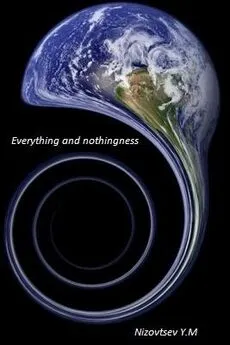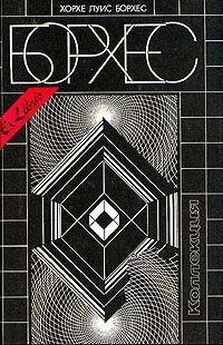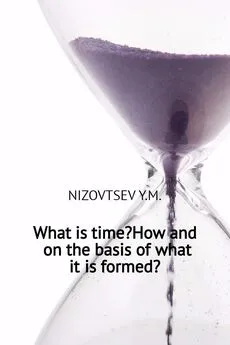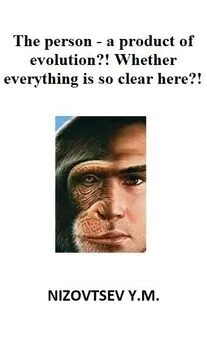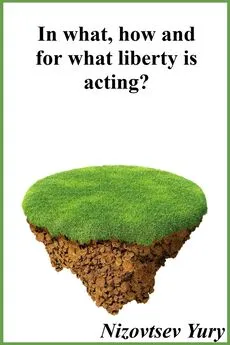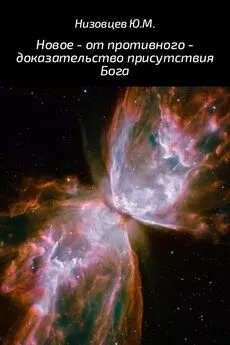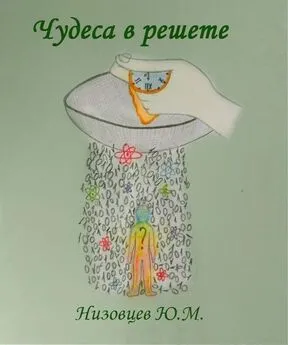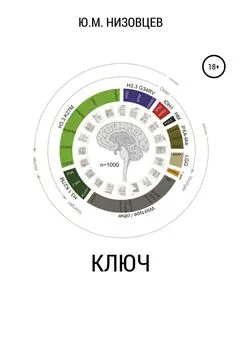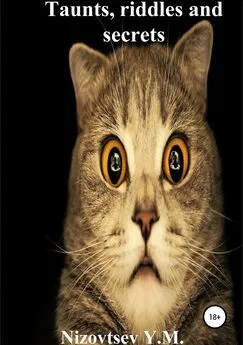Юрий Низовцев - Everything and nothingness
- Название:Everything and nothingness
- Автор:
- Жанр:
- Издательство:Array SelfPub.ru
- Год:неизвестен
- ISBN:нет данных
- Рейтинг:
- Избранное:Добавить в избранное
-
Отзывы:
-
Ваша оценка:
Юрий Низовцев - Everything and nothingness краткое содержание
Everything and nothingness - читать онлайн бесплатно ознакомительный отрывок
Интервал:
Закладка:
It is capable to exist in addition to people and multiform living beings that get through its sense organs feeling of life, perceiving pleasure with satisfaction, and threat with a opposition, which is possible for them. I.e. any others living beings if can't be engaged in searches of meanings as the person, they nevertheless is capable to perceive, unlike a stone, the surrounding, to react to it, plunging into received life though without cogitations, but with full knowledge of reality at the level of own consciousness. In other words, in any living there are centers processing incoming information through sensations – a kind of internal biological computer, – due to the action which even the bacterium has a certain intelligence and, respectively – proper response to any irritations. Presence of consciousness of this or that level at all living is confirmed by this fact.
To extend consciousness on all living it wasn't possible also to Heidegger, who though understood that the human reason in beingness solves the problem of the analysis of the real, but he didn't manage to define that this real "is given" to all living beings including to the person, in an original, true form so, how their sense organs are capable to feel, and actually – "to transfer" things with the hidden help of single consciousness in copies from Uniform into own beingness.
Heidegger, like most thinkers before him, didn't realize this fact and considered data of sensations as the doubtful: “What is “proximally” given is this waxen Thing which is coloured, flavoured, hard, and cold in definite ways, and which gives off its own special sound when struck. But this is not of any importance ontologically, nor, general, is anything which is given through the sense” [4, p. 129].
However function of single consciousness doesn't include immediate "interpretation" for individual consciousness of essence of things, the more that it is senseless for consciousness of the living beings besides the person so how they "use" that "is given" to them, evolving it on own evolutionary way often enough successfully, and making the general base for the person as self-conscious being without which he couldn't exist.
Each individual consciousness through the person and human communities itself has to examine in things, comprehending them essence at appropriate levels of knowing in dependence on conditions. This is the main task of consciousness in the person, which he solves in beingness, not just the life that is given to consciousness in any living being. In the solution of this task in the conditions of the resisting environment, i.e. in lives, each individual consciousness in the person receives or no receives own development, raising the status in own eyes in the infinite change, altering conditions of own existence.
Heidegger avoids the question of essence of beingness, transferring it to the plane of meaning of beingness and finding it in concern that it is possible to transfer into considering of the main task of the person concern about beingness and, as a result, about itself: “… the expression “concern” will be used in this investigation as an ontological term for existenciale, and will designate the Being of a possible way of Being-in-the-world. This term has been chosen not because Dasein happens to be proximally and to a large extent “practical” and economic, but because the Being of Dasein itself is to be made visible as care” [4, p. 83-84].
If the world, according to Heidegger, is provided to the person, it also bases all his reasonings on the person, that is incorrect in the basis, inasmuch the person as finite, isn't the center of beingness, but he is only a development tool of infinite consciousness in the beingness conditions provided to it through his sensations and on the basis of the level of specific individual consciousness. Beingness opens through short human lives to consciousness which develops in these lives.
Heidegger reproaches Descartes, that "can he identify the world itself with certain entities within-the-world and the Being which they possess?” [4, p. 131].
Heidegger is worthy the same reproach so how also to him neither phenomenon of the world, nor "within-the-world" remained are unknown inasmuch its model of beingness is hardly close to essence of beingness. The matter is that Heidegger places emphasis on beingness as the condition of the opportunity of the real, – but which (beingness) is only derivative of consciousnesses through Uniform, – and not on consciousness which forms this beingness, or transfers the opportunity into reality.
1.5. Manifestation of consciousness at the levels of the live
So what characterizes all living beings, including the person, and distinguishes from other things if to exclude thinking?
Certainly, it is sensations, without which there is no only food for thought, but also there is no life. Therefore it is possible to tell: "It is feeling, means it lives". The reality shows, that this thesis is true: try to swat a cockroach or to catch a small fish by a hand; and they and all other living beings will evade in every way from death, i.e. any living being doesn't want to lose sensations at all, or the existence in life, though it doesn't understand that means not to live.
Hobbes formulated idea of domination of sensations as the basis for human mind as follows: “… for there is no conception in a man's mind, which hath not at first, totally, by part, been begotten upon the organs of sense” [7, p. 1]. In a certain degree here he hinted that a truth source, as such, is sensations, that is adequate to a situation.
Locke developed Hobbes's thought about sensations, making a source of ideas, having designated their origin from sensations as well as mind, and having introduced experience as criterion of truth of the knowledge, gained from these sources: “All ideas come from sensation or reflection… all that our knowledge is founded, and from that it (experience) ultimately derives itself… The objects of sensation one source of ideas. – First, Our senses, coversant about particular sensible objects, do convey into the mind several distinct perceptions of things, according to those various ways wherein those objects do affect them… The operations of our minds the other source of them. Secondly, The other fountain, from which experience furnisheth the understanding with ideas, is the perception of the operations of our own mind within us, as it is employed about the ideas it has got; which operations, when the soul comes to reflect on and consider, do furnish the understanding with another set of ideas, which could not be had from things without; and such are Perception, Thinking, Doubting, Believing, Reasoning, Knowledge, Willing, and the different actings of our own mind…” [22, p. 77].
Locke's removal from prime beginning – sensations, couldn't but lead him to thought of check of the different ideas, arising on the basis of sensations. As criterion of truth for correction of distortions, arising in the course of formation of ideas, Locke offers experience. In this approach of Locke to definition of truth is looked through the understanding of the fact that progress towards truth is an aspiration to explain the nature of objects and phenomena. This means understanding of the impossibility of possessing by the person of absolute truth.
On the other hand, the experimental verification of the ideas proposed by Locke is the rejection of the concept of "innate ideas":“… men, barely by the use of their natural faculties, main attain to all the knowledge they have, without the help of only of any innate impressions; and may arrive at certainly, without any such original notions or principles” [22, p. 7].
In this opinion Locke both is right, and isn't right, inasmuch the crux of the matter consists in – to whom should be attributed these form-building abilities or ideas.
In human consciousness these form-building abilities or ideas are hidden, more precisely, directly they can't be manifested, so how the person is obliged to start acting in life with "blank sheet", to find new ways, but not to be under the influence of already known. Along with that, "congenital ideas", and actually form-building abilities of single consciousness, are a basis of all real, inasmuch the lifeless matter can't produce any ideas, unlike consciousness. Therefore single consciousness, which is present at each person, forms all environment, surrounding him, through his sensations on the basis of the passive from Uniform.
Single consciousness in a varying degree understands itself and understands that it wants and can, and, as a result, it finds ways of own development both on own level, and on the level of each individual consciousness in the environment which except it couldn't be formed on own projects.
Our reasoning and digression to history lead to thought, that there are two levels of consciousness – the lowest, which includes all the living, self-perpetuating, adapting to the environment, changing in it, acting instinctively and reflexively, perceiving the fact of own existence at the level of sensation; and the highest level of consciousness which differs from the lowest only by the fact that to the perception of sensation is added the awareness of self, expressed not only in thinking, the speech, but also in imagination, memory, different experiences and passions, will, perpetual aspiration to liberty against any order.
Any consciousness, and not just human consciousness, produces own world, copying and receiving every moment via channels of the sense organs which are available for own carrier, of course, not a direct image of all Uniform, which is the infinite, but, receiving display of those fragments from Uniform which this individual consciousness is capable to identify and bind with the hidden help of single consciousness.
All this initial copying of the recognizable fragments from Uniform any individual consciousness carries out automatically as it can, according to own level of development, own sense organs, but in contact with single consciousness, inasmuch individual consciousness in the carrier, whether it be a bacterium or the person, in a separation from single consciousness can't deploy a full picture of own world in the present, formed by it, and it also doesn't exist in a separation from single consciousness, making in the holographic projection not its part, but being by self single consciousness.
The living beings without self-consciousness are completely subordinated to the need in the world which is manifested through their sense organs without realizing itself.
However the living beings without self-consciousness potentially comprise the germ of liberty so how they at own level through own sense organs by means of single consciousness forms own time of life, own environment and seeks to survive in it.
But the living beings without self-consciousness do not yet have the opportunity to be aware of itself in this world, unlike the beings understanding self. Nevertheless any "simple" living being differs from a thing, inasmuch it senses and has the master intellect according to which it can adequately act in the world of the phenomena, without going deep into their essence. Thereby any "simple" living being is a threshold of the highest consciousness, without which the last isn't capable to manifest, inasmuch only the living being has sense organs, and without sensations and the person and any other organism, understanding itself, can't "enter" into existence into the real, moving world.
As a rule, self-consciousness is manifested in the living beings without self-consciousness on the highest level of their developments. These beings are used by the highest consciousness which is taking root into them as a basis for development of the got formation. Therefore single consciousness primarily copies itself in the form of the living beings without self-consciousness in the "external" world formed by him as uniform consciousness providing the living beings suitable conditions for gradual development, which is expressed in creation by each living organism of his "now" within "the external". Actually, development of the living organism consists in reworking by its consciousness of the reality formed by it as being updated "now", in every moment which consciousness through sensations "replaces" gradually and consistently copies of previous objects of environment on objects, which provide to it the best adaptability by environment and the most favorable living conditions.
Читать дальшеИнтервал:
Закладка:
